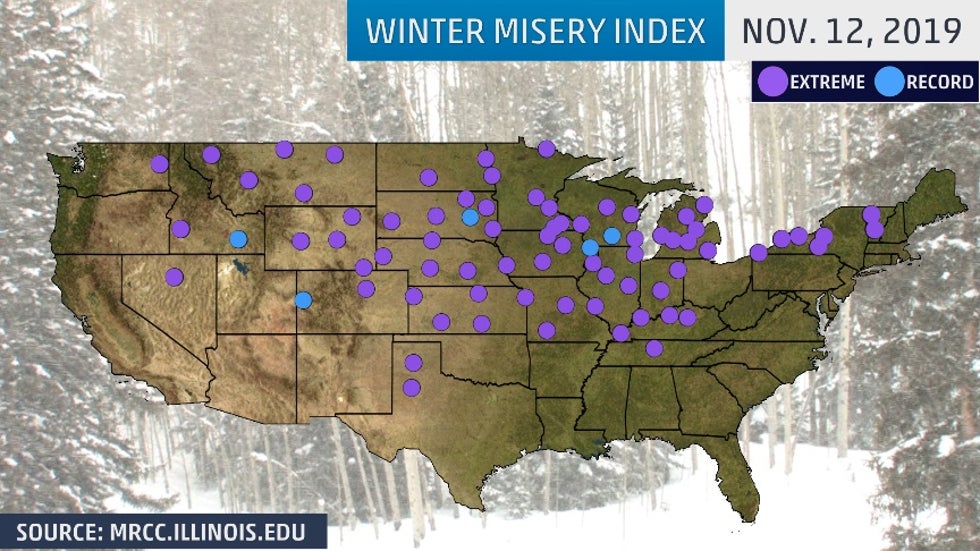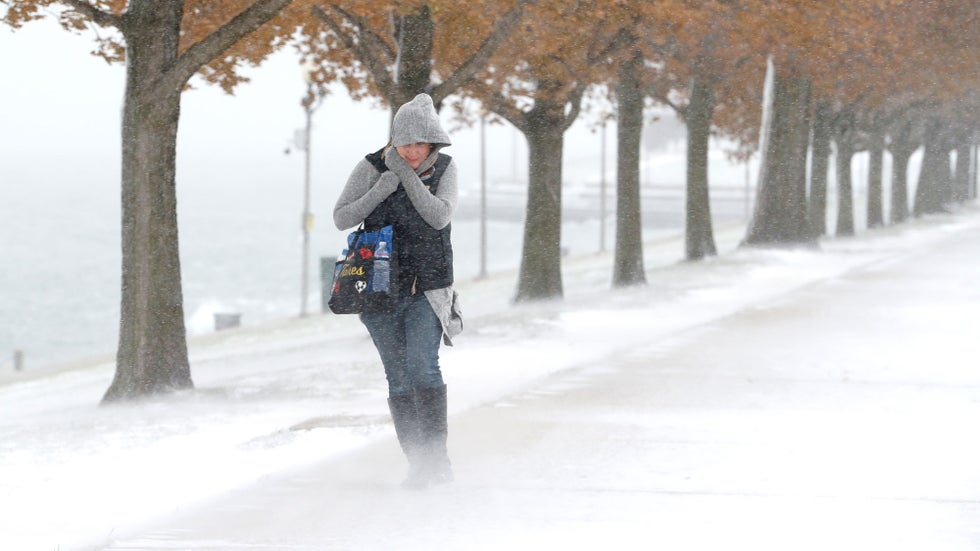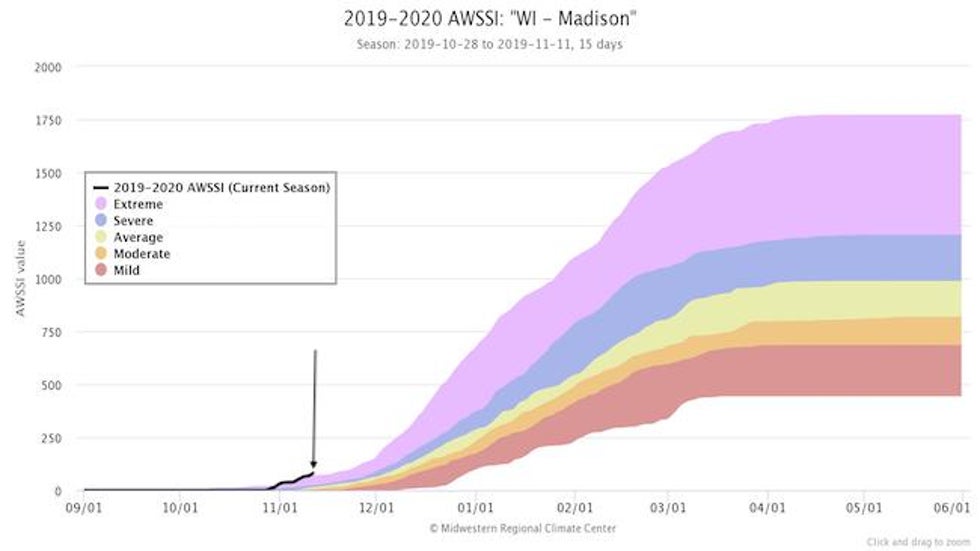It's already one of the coldest and snowiest starts to the winter season from the Rockies to the Great Lakes, and we're not halfway through November yet.
According to the Accumulated Winter Season Severity Index (AWSSI) from the Midwest Regional Climate Center, over 70 cities from the Great Basin and Rockies to the Plains, Midwest and eastern Great Lakes have seen an extreme season-to-date of cold and snow as of Nov. 12.

This index, also known as the winter misery index, takes into account the "intensity and persistence of cold weather, the frequency and amount of snow and the amount and persistence of snow on the ground," the Midwest Regional Climate Center says. Wind and mixed precipitation, such as freezing rain, are not a part of the index.
The index uses five categories – mild, moderate, average, severe and extreme – to rate the severity of winter weather in cities across the U.S.
For any given location, the start date of the winter season is defined as when the first measurable snowfall (at least 0.1 inches) occurs or when the first high temperature of 32 degrees or lower is recorded. The start date is Dec. 1 for any location that does not see either of those happen before that date.
"The contribution of early season cold and snow events to winter severity is very small in all but the warmest climates," said Dr. Barbara Mayes Boustead, a co-creator of the index and an instructor at the National Weather Service's Warning Decision Training Division in Norman, Oklahoma.
Cities categorized as having an extreme winter so far ranked in the 99th percentile of the index through Nov. 12.

Almost every Great Lakes city is in that 99th percentile so far, including Buffalo, Detroit, Milwaukee and Chicago. Detroit's winter misery index jumped up after 9.2 inches of snow from Veterans Day into Tuesday set the city's all-time November snowstorm record.
Louisville, Nashville and St. Louis were among cities farther south also off to an extreme start to winter so far, due to snow from Caleb and this week's cold outbreak. Nashville's Veterans Day snow, while only 0.4 inches, was its earliest-in-autumn snow in 23 years.
Dozens of other cities in the upper Midwest, Plains, Rockies and northern Great Basin are also in that elite 99th percentile of starts to winter so far. Among these cities were Kansas City, Des Moines, Minneapolis-St. Paul, Denver and Boise.
A number of factors have contributed to this miserable start.
Three separate snowstorms in late September, early October, mid-October and late October hammered the northern Rockies and northern Plains.
A two-week siege with multiple snowfalls blanketed the upper Midwest and Plains from Halloween week through this week.
And the cold outbreaks following some of those snow events only punctuated the January feel to this fall. October 2019 was among the 10 coldest Octobers in 12 states from the Northern and Central Plains to Washington and Oregon.
The Record Miserable Winter Cities So Far
Here are the cities that have set a record winter misery index values through Nov. 12:
-Dubuque, Iowa: This northeastern Iowa city along the Mississippi River already picked up 13.9 inches of snow through Veterans Day, its record-snowiest start to any season. This tops its previous snowiest autumn-to-date from 1925. It typically takes until Dec. 29 for that much seasonal snow to fall there. Dubuque's three-week period ending Veterans Day was the coldest Oct. 22-to-Nov. 11 period on record in 147 years there, according to the Southeast Regional Climate Center.
-Huron, South Dakota: This eastern South Dakota town has almost triple its average snowfall season-to-date (8.5 inches). Huron has had lows in the single digits four of the past seven days through Nov. 12.
-Madison, Wisconsin: Like Dubuque, the Badger State capital city has its snowiest start to any winter season through Veterans Day on record (15.4 inches). At least a trace of snow was reported in Madison 10 of 15 days from Oct. 28 through Nov. 11. If it wasn't for a balmy Sunday before Halloween, Madtown would have a 19-day streak of colder than average temperatures from Oct. 24 through Veterans Day.
-Grand Junction, Colorado: It hasn't been particularly snowy on Colorado's western slope. It's just been stubbornly cold. October 2019 was its coldest on record. On Oct. 30 and 31, it plunged to 7 and 6 degrees, respectively, the first single-digit October lows on record there. It has been less cold recently, but those October arctic outbreaks pushed the city into record season-to-date territory.
-Pocatello, Idaho: Similar to Grand Junction, the cold has been the story in southeastern Idaho. Pocatello also shivered through its coldest October in 80 years, punctuated by its first October subzero low (minus 6 degrees on Oct. 30) on record. This frigid reading was 13 degrees colder than its previous record October low.

Is this winter index so far predictive for the rest of winter?
"It may look and feel severe for this time of year – and it is – but it is not a harbinger of the winter to come," Mayes Boustead said.
The Weather Company’s primary journalistic mission is to report on breaking weather news, the environment and the importance of science to our lives. This story does not necessarily represent the position of our parent company, IBM.
The Weather Company’s primary journalistic mission is to report on breaking weather news, the environment and the importance of science to our lives. This story does not necessarily represent the position of our parent company, IBM.

No comments:
Post a Comment